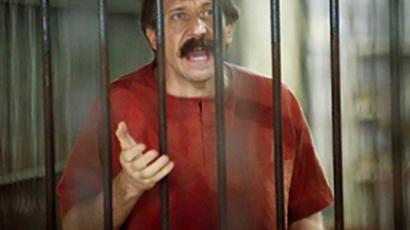Bout convicted in ‘arms smuggling’ case, may get life
A New York jury has convicted Russian arms dealer Viktor Bout of trying to sell heavy weapons to a Colombian terror group. He could face from 25 years to life in prison.
Bout will be sentenced on February 8, 2012.A federal jury in New York City reached the verdict on Wednesday. Bout has been convicted of seeking to make millions of dollars in a proposed deal with a terror group enabling it to attack what prosecutors said he told his customers was a common enemy, namely the US forces helping the Colombian government.The jury had been deliberating since Tuesday in a federal court in Manhattan. The arms dealer was convicted of conspiracy to kill US citizens, including US officials, to deliver anti-aircraft missiles and aid a terrorist organization.Defense attorney Kenneth Kaplan says it was a tough case.”We’re disappointed, obviously,” he is quoted as saying by AP. The defense has said that Bout will appeal against the verdict. That can be done until December, 2.George Mapp, an investigative journalist who's been following the case, says Victor Bout was too shocked to react to the news.”The case against Victor Bout for all practical purposes is a case closed. After the jury was dismissed, Victor Bout stood there as if he was in shock. He didn’t react in any way – as if he was lifeless. He didn’t even turn around to face anybody,” he said.
From ‘Bangkok Hilton’ to US
Bout’s trial began three weeks ago, but his tribulations started long before that. Arrested in a US Drug Enforcement Administration sting operation in the Thai capital Bangkok in March 2008, he first spent months in the infamous “Bangkok Hilton” – one of the world’s most notorious prisons – while awaiting his extradition hearing. Despite many claims of pressure on the Thai court by US officials, the lengthy proceedings finally came to a close in 2010, when Bout was sent to the US.
Charges faced by Bout: – conspiring to kill American nationals; – conspiring to kill American officers and employees;– conspiring to acquire and use anti-aircraft missiles;– conspiring to provide material support to the FARC rebels in Colombia
Bout has maintained his innocence throughout the case, stating his business was sales and services in the shipping industry.US prosecutors, however, insisted that Bout is one of the world’s most prolific black-market arms dealers, and backed up their charges with a conversation with Bout recorded during the sting operation in Thailand. But the state’s confidence in a guilty verdict was shaken when New York Southern District Court Judge Shira Scheindlin threw out Bout’s testimony made prior to his extradition to the United States. Scheindlin said Thai officials allowed serious procedural violations by refusing Bout a meeting with his attorneys.
Russia has repeatedly criticized Bout's extradition from Thailand to the United States as ‘extreme injustice’, but as international extradition lawyer Douglas McNabb says, under US law it is possible to kidnap people they deem to be a threat.”There is US Supreme Court authority that says it is okay for the federal agency to go into a foreign country and, in contravention of that country’s law, kidnap an individual and bring him to the US to stand trial in the US,” he said. “So I see that, potentially, issues [of kidnapping] could be raised with regard to the appeal. I’m not hopeful those are going to be successful issues, given the state of the US Supreme Court authority with regard to extradition.”
Movie hero and stumbling block
The case has attracted media attention from the very beginning, not least because of Bout himself. A Hollywood movie starring Nicolas Cage as Bout gave him a lot of notoriety, to the point where jury members had to sign pledges vowing not to Google the man on trial, so as to remain unbiased.The case has also had an effect on relations between Moscow and Washington – and not a positive one. Russia believes Bout’s extradition was only possible because of unprecedented political pressure on Thai judicial authorities, and that the trial was lost before it had even begun. Many, both in Russia and abroad, seemed to share that opinion, claiming that after all the effort and media coverage associated with Bout and his trial, prosecutors simply could not afford to lose the case.














